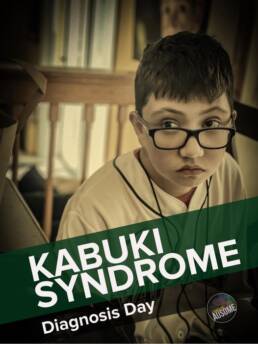Today was the “official” diagnosis day for Jonny.
“Jonny has Kabuki Syndrome”
It is a mix of emotions, but mostly I’m glad to have this DONE.
15 years. 4 geneticists. 3 genetic tests. 3 negative test results. Multiple surgeries. Several developmental delays. Countless hours of therapies.
NO real answers.
Until today.
Jonny has finally received an official clinical diagnosis of Kabuki Syndrome.
At bedtime, Jonny asked me if “I was glad to have that weight off of my shoulders.” (Yes, he was more concerned about how I was handling HIS diagnosis than he was about actually receiving it).
I’ll probably be unpacking all these emotions for a while, but the overarching feeling I get is relief and gratitude.
After so many years, we finally have some medical answers and the tools to move forward as Jonny slowly approaches adulthood.
“Jonny has Kabuki Syndrome.”
A geneticist finally confirmed it.
And as odd as it sounds, that is something to be #thankful for.
Because look at where we were in this post from a year ago.
——————
[July 6, 2022]
So this is our current issue with Jonny, who is turning 14 this month.
Jonny was born with several medical issues. He had a cleft palate. He had bilateral hip dysplasia (dislocated hips at birth), and had several corrective surgeries before he was a year old.
He has other “abnormal” features like low muscle tone (he cannot cut his own fingernails or walk down stairs or down hill unaided), loose/hyper-flexible joints and slight hearing loss.
He also has several other developmental delays along with sensory and behavioral issues.
He had a genetic “micro-array” test done at birth which returned negative for any known genetic conditions.
Three years ago, we became aware of something called “Kabuki Syndrome,” a 1:32,000 diagnosis which perfectly describes Jonny’s medical disposition and could account for EVERY single physical and developmental/behavioral abnormality.
A gene responsible for Kabuki syndrome was discovered in 2009, the year after Jonny’s first genetic test and a second gene causing Kabuki syndrome was also recently discovered….
So we went back to the geneticist who concurred with our assessment and had him tested just for Kabuki Syndrome.
I was sure it would come back positive.
But the test came back negative…
This doesn’t mean Jonny doesn’t have Kabuki Syndrome, it just means our current genetic technology did not detect it. There may be more genes responsible for Kabuki Syndrome that have simply just NOT been discovered.
But this left us in a tricky situation. The geneticist is convinced that Jonny does have “A SYNDROME” though he cannot definitively label it based on our genetic tests.
So the next step would be to have a WES (Whole Exome Sequence) genetic test on Jonny, his mother, and myself which the geneticist figures there is probably a 70% chance will not reveal anything new, but will cover all our genetic testing bases.
The problem is that our insurance will not cover this test and it is THOUSANDS of dollars out of pocket.
Is it worth it to have this test done?
What difference does it make?
As far as affecting Jonny, it makes no difference whatsoever. He’s the same kid either way.
But with a diagnosis, Jonny will have more access to helpful therapies like PT or OT and have them covered by insurance.
With a diagnosis, when Jonny turns 18, if he needs disability accommodations or insurance benefits related to his diagnosis at any time throughout his life, they will be covered.
He is not currently diagnosed with “anything” so as of now, it would all have to be out of pocket.
Our developmental pediatrician said that if the WES comes back negative or if Genetics drags its feet on a clinical diagnosis, she would be willing to revisit an autism diagnosis specifically to get Jonny the coverage and insurance benefits of that diagnosis.
Now, autism was ruled out very early when Jonny was young, though he had a slight speech delay. But our doctor said that he has “enough” autistic tendencies now to merit a possible autism diagnosis, especially since his younger brother was diagnosed (severe autism) in 2016.
But is Jonny “actually” autistic?
It’s hard to say. One of the “conditions” of Kabuki Syndrome is “autistic-like tendencies,” which Jonny certainly displays.
So are these tendencies “autism” AND “Kabuki Syndrome,” or is it the autistic-like tendencies which are simply a PART of Kabuki Syndrome?
🤷♂️
So on one hand, I want Jonny to have access and coverage to the therapies he needs right now and the accommodations he will need as an adult, which would be provided with an autism diagnosis…
But on the other hand, I want the most accurate diagnosis possible, because “whatever” this is…
…it is part of Jonny’s identity. And I want Jonny to know and love who he is.
#Thanksgiving
#ausome
#autism
#kabukisyndrome
#myraretreasure
